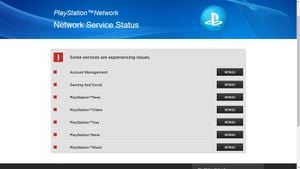Google and Meta, two of the largest technology giants, are under increasing scrutiny from South Africa's competition authority, which has raised concerns about their business practices with local news organizations. Following a lengthy 16-month investigation, the authority suggested significant financial penalties aimed at these major tech firms, signaling a potential shift toward more stringent regulations concerning digital media compensation.
According to reports, the competition authority proposed requiring Google to pay up to 500 million rand, approximately 27 million dollars per year, as part of efforts to support local journalism. This payment is part of broader efforts to address how tech companies manage their relationships with local news outlets, which have struggled financially amid rising digital competition. By mandatorily compensing local media, the authority aims to help secure the future viability of journalism within South Africa.
The recommendations suggest more than just monetary penalties; they also call for Meta to refrain from deprioritizing news content on its platforms. Critics have long argued the way these companies operate undermines the financial stability of traditional news outlets. By downplaying local news on platforms like Facebook, these corporations could be seen as diminishing the journalism ecosystem, making it harder for it to thrive.
The challenge for Google and Meta is not just regulatory compliance but also the broader implication for how tech companies will interact with news organizations moving forward. Representatives from the competition authority revealed, "Google's actions undermine the ability of news media to secure and monetize digital traffic," highlighting the perceived market dominance and the negative impact on local journalism.
Despite these measures, there is acknowledgment within the authority of the overall competitive marketplace, prompting the needs for balance between innovation and fair competition. The next steps involve both Google and Meta responding to the proposals within six weeks, after which the final report will be made public within four to five months.
This move reflects growing global skepticism directed at technology giants. Around the world, regulators are increasingly focusing on monopolistic practices by tech companies as concerns grow about their influence on media and public discourse. With local journalism facing existential threats amid the digital revolution, South Africa's actions could mark the beginning of more aggressive stances against companies like Google and Meta.
These recommendations are expected to draw attention not only within South Africa but globally, as other nations grapple with similar challenges related to digital media and regulatory oversight. If these measures are enforced successfully, they could potentially serve as models for other countries experiencing similar pressures from powerful technology firms.
The importance of these regulations cannot be understated. Encouraging tech companies to fairly compensate news agencies could help stabilize the journalism ecosystem, allowing for diversification and improved quality of news coverage. This approach could also pave the way for more equitable collaborations between digital platforms and news organizations.
For now, both Google and Meta are facing intense pressure to adapt to these recommendations. The financial stakes are significant, but the ramifications extend beyond mere dollar amounts, encapsulating the very essence of how media should function in the age of technology.
Overall, the actions proposed by South Africa's competition authority highlight significant transformations within the media industry, as technology companies find themselves increasingly intertwined with the survival of journalism. These potential penalties against tech giants could represent both the fears and hopes of the future of news.



